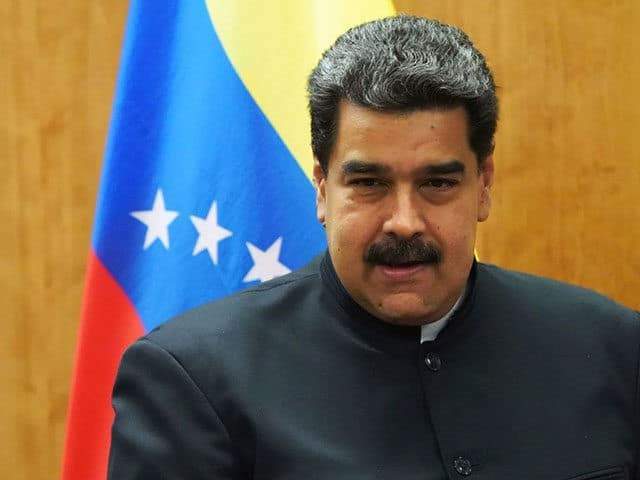The Hague: ‘Reasonable Basis’ for Crimes Against Humanity Case Against Venezuela’s Maduro

The official office of the top prosecutor at the International Criminal Court (ICC) announced this week that it had found “a reasonable basis to believe” socialist Venezuelan dictator Nicolás Maduro had committed crimes against humanity.
The declaration, which opens the door to prosecuting Maduro at the world’s top court for violent political crime, received near-universal praise from members of the Venezuelan opposition and the human rights community.
The ICC only has the power to act regarding acts in nations that are signatories to the Rome Statute, which created the venue. As Venezuela is a signatory, the prosecutor found the court did have jurisdiction to prosecute Maduro — unlike its conclusion regarding a complaint to the ICC against China for building over 1,000 concentration camps for ethnic minorities, which noted China is not a party to the Rome Statute.
The next step in the process would be to open a formal investigation, potentially leading to a trial against Maduro at The Hague. The Venezuela case has been in its “preliminary” stage since 2014, but investigators only actively began processing claims in 2018.
The ICC can only process cases involving allegations of war crimes, crimes against humanity, the crime of aggression, and genocide.
Maduro, who seized power in 2013 after the death of predecessor Hugo Chávez, has systematically used the nation’s armed forces to repress dissidents. Eyewitnesses to mass protests events, which spanned from 2014 into 2017 before socialist opposition leaders began attempts at “dialogue” with Maduro, have claimed to experience or witness killings, beatings, instances of rape, and torture at the hands of the Bolivarian National Guard (GNB). Maduro has also reportedly used colectivos, roving socialist gangs, to attack churches and opposition coalitions.
Maduro’s policies have especially hurt Venezuelan children, thousands of which have died in violent exchanges involving state security since Maduro took over.
Maduro has not been legally president of Venezuela since January 2019, but continues to control the state through his stranglehold on the military.
“Following a thorough assessment and analysis of the information available, the Office concluded that there is a reasonable basis to believe that crimes within the jurisdiction of the Court have been committed in Venezuela since at least April 2017,” the office of the ICC prosecutor announced in its annual report. The office’s job is to evaluate if allegations of the crimes the court has the power to process are sufficient to open a case.
The court listed among the specific crimes alleged:
imprisonment or other severe deprivation of physical liberty in violation of fundamental rules of international law pursuant to article 7(1)(e); torture pursuant to article 7(1)(f); rape and/or other forms of sexual violence of comparable gravity pursuant to article 7(1)(g); and persecution against any identifiable group or collectivity on political grounds pursuant to article 7(1)(h) of the Rome Statute.
The ICC noted that the suspected culprits of these crimes were “civilian authorities, members of the armed forces and pro-government individuals.”
The ICC’s report also noted that the Maduro regime had requested a separate investigation into crimes against humanity in Venezuela, but alleging that it was the United States, not the socialist government, that was violating human rights. The Maduro regime alleged that sanctions on senior Maduro regime officials and sanctions on key revenue sources for the regime, like Venezuela’s state-run oil company PDVSA, was itself a crime against humanity. The court did not express that it had found sufficient evidence for that claim to result in a full trial.
Elsewhere in its comments on Venezuela, the ICC attacked the Organization of American States (OAS) for condemning ICC inaction on Venezuela. The General Secretariat of the Organization of American States had condemned top ICC prosecutor Fatou Bensouda in a statement this month, calling the lack of action against the Maduro regime “stunning” and “inexplicable.”
An OAS report published this year documented 18,093 killings committed by officials state actors or colectivos and 653 confirmed cases of state torture. Jared Genser, the author of the OAS report, told the Argentine news agency Infobae, “we can’t explain why prosecutor Fatou Bensouda is not taking any action.”
Venezuela remains a member of the OAS at press time despite violating a key provision in the OAS charter that all members must be democratic states.
“The Office regrets the tone and manner of the report issued by the General Secretariat of an international organisation with which the Office and the Court as a whole expect to cooperate in a spirit of good faith and mutual collaboration,” the ICC responded, adding that it nonetheless “understands the frustrations that appear to motivate” the OAS.
Like the OAS and the ICC, the United Nations announced in September that investigations had revealed concrete evidence of Maduro regime use of torture and killing to silence dissidents and subdue protests.
“The Mission found reasonable grounds to believe that Venezuelan authorities and security forces have since 2014 planned and executed serious human rights violations, some of which — including arbitrary killings and the systematic use of torture — amount to crimes against humanity,” chief investigator Marta Valinas, who organized the U.N. mission, said at the time. “Far from being isolated acts, these crimes were coordinated and committed pursuant to State policies, with the knowledge or direct support of commanding officers and senior government officials.”
Like the OAS, the United Nations has not punished the Venezuelan regime. Maduro’s government is a member of the U.N. Human Rights Council.
Photo: DON EMMERT/AFP via Getty Images
Link: The Hague: 'Reasonable Basis' for Maduro Crimes Against Humanity Case (breitbart.com)




